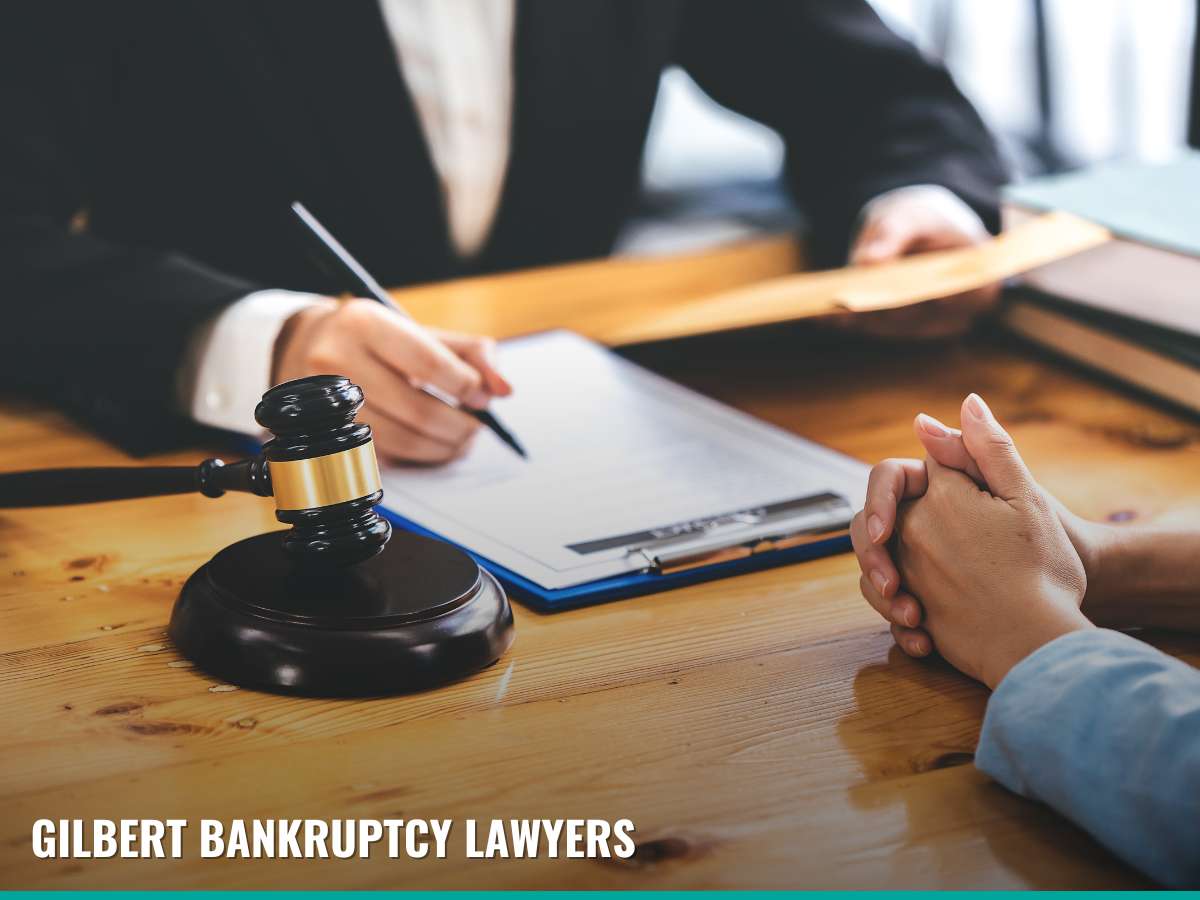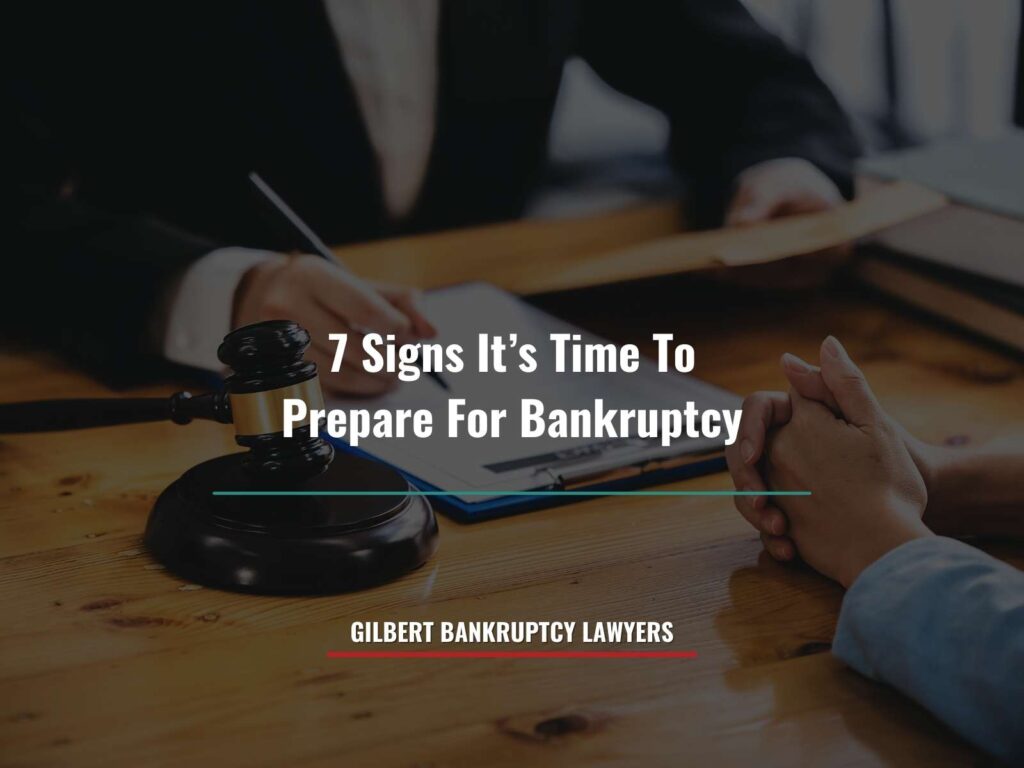Most American households carry at least some debt and might not be prepared for emergency expenses while living paycheck-to-paycheck. Since debt is so common, it can be difficult to discern between what is an ordinary financial situation and when debts have gotten out of control. However, there are some experiences that many debtors have in common before filing for bankruptcy. Read on to learn more about the signs that it’s time to consider filing for bankruptcy to clear debts and protect yourself from creditors. To discuss your situation in detail with an experienced Arizona bankruptcy professional, call 480-448-9800.

1. You Can’t Answer Unknown Numbers Due To Creditor Calls.
You can expect almost every creditor to relentlessly pursue you over the phone before resorting to more drastic measures. If you owe debts to more than one creditor, you probably decline several calls per day from unknown numbers. When you do answer, the nicer ones may try to sign you up for a payment plan you can’t afford, and ruder ones may be insulting or even make threats against you. This can be distracting and counterproductive towards the goal of settling your unpaid debts. It can also cause you to miss calls that are important because you are avoiding calls from creditors. The good news is that you can enjoy a barrier from the creditor calls sooner than when your bankruptcy petition is filed. Creditors must stop contacting you upon learning that you have hired a bankruptcy lawyer and begin directing all communication towards your attorney instead. This will allow you to focus on an accurate and effective bankruptcy filing so that you can never hear from your creditors again after your case is discharged.
2. You Have Received A Summons For One Or More Of Your Debts.
If you ignore enough creditor calls without resolving the debt, they may eventually pursue you for repayment through a lawsuit. You will know this process has started when you receive a summons. This is an official notification that you are being sued and have an upcoming court date. You should put forth your best efforts to resolve your debts before that hearing occurs, but bankruptcy can still clear a non-fraud lawsuit judgment a fter the case is complete. Your creditor can use a judgment from a lawsuit to pursue you with more aggressive methods, so you should be prepared for bankruptcy if you don’t have solid defenses to present at your hearing.
3. Your Wages Are Being Garnished
One of the aggressive collection methods that a creditor can use after obtaining a judgment mentioned above is a wage garnishment. In Arizona, most creditors can garnish up to 25% of your wages. Chances are, if you already have a debt that has proceeded to the wage garnishment stage, losing a quarter of each of your paychecks will make your financial situation considerably worse. You can ask the court to reduce your garnishment, but 15% is the lowest the court can issue, and only after a showing of financial hardship. If you file for bankruptcy, the automatic stay will stop your creditors from garnishing your wages, with the exception of child support wage garnishments in chapter 7 bankruptcy. You may find it easier to regain control of your financial situation once a significant portion of your pay is no longer automatically going to your creditors.
4. You Struggle To Make The Minimum Payment On Your Credit Card Debt.
Credit cards can be useful in a pinch, come with incentivizing points programs, and can even help contribute to your credit history. But they come with downsides like annual fees and interest rates that are less than favorable. Paying the full balance each month is the ideal way to avoid these risks, but that isn’t always possible. The other end of the spectrum is making late payments and only paying the minimum balance due each month. When you only pay the minimum balance on your credit card debt, you might not even be paying off the interest you are accruing each month. This will cause your balance to slowly creep upwards until you can no longer afford even the minimum payment.
5. You Experienced A Medical Event Outside Of Your Control.
Medical debt is the leading cause of bankruptcy in the United States. You can’t always prepare for a medical emergency, and your condition could affect your ability to work and earn an income temporarily or permanently. Many people with unmanageable medical debt file for bankruptcy because it is an unsecured non-priority debt, which is the simplest type of debt to clear with a bankruptcy filing. If a debtor primarily needs to shed medical debts and doesn’t have a chronic condition, bankruptcy provides an opportunity to get back on track and avoid falling back into debt. The debtor should be aware that some medical providers may cease providing treatment if their unpaid bills are discharged in bankruptcy.
6. You Are About To Lose An Asset To Repossession.
When one thinks of repossession, often what comes to mind is vehicle repossession. But any type of asset that is collateral to a secured debt can be repossessed by a lender if the borrower falls behind on their payments. A home foreclosure is also considered a type of repossession. Home foreclosures require more notice and compliance with procedures than other types of repossession. If you have a secured asset, you should review the terms of your agreement to determine when your creditor would have the right to proceed with a repossession- it is often after just one missed payment. But you can stop a repossession from happening by filing for bankruptcy and triggering the automatic stay. In some cases, you can also use bankruptcy to save a vehicle that has already been repossessed, but the process is much more straightforward if you file before the repossession.
7. Alternative Debt Repayment Arrangements Will Take Several Years.
Some of your creditors may be willing to work out delayed payment plans, because it’s better to collect some of a debt than none of it. These plans will also rely on you consistently making your payments, which could all be derailed if you experience any type of financial setback. Defaulting on this type of arrangement could lead you to an inevitable bankruptcy after wasting time and funds on a failed payment plan. If your alternative payment arrangements are risky or will take years to pay in full, it may be less burdensome for you to declare bankruptcy. If you qualify for chapter 7 bankruptcy, you can discharge your bankruptcy in a matter of just a few months. It can also help you avoid spending funds on debt negotiations that could be put towards a bankruptcy you will end up filing anyway.
8. Learn More About Your Debt Relief Options With Our Arizona Bankruptcy Team
Bankruptcy isn’t right- or even an option- for everyone. But if you are experiencing any of the signs that it may be time to consider bankruptcy described above, you don’t have to make this choice on your own. Our Arizona bankruptcy team offers free consultations by phone so you can learn more about how bankruptcy laws will apply to your specific situation. You don’t need to wait until creditors have wrung you dry to file for bankruptcy. We also remove cost as a barrier by offering our consultations free of charge, and post-filing Zero Down payment options for eligible clients. Get the facts straight from an experienced bankruptcy lawyer in the Phoenix or Tucson area. Schedule your free consultation today by calling 480-448-9800.
